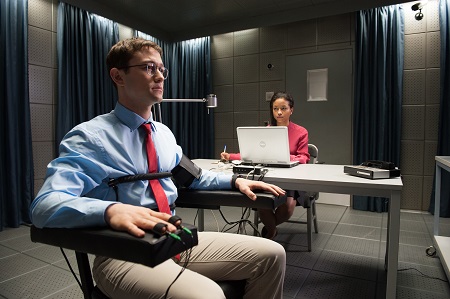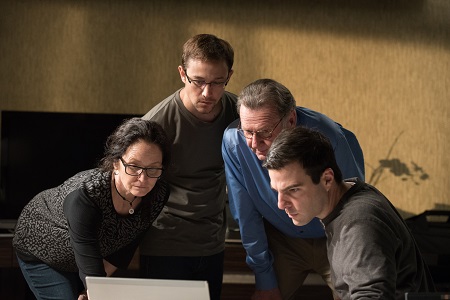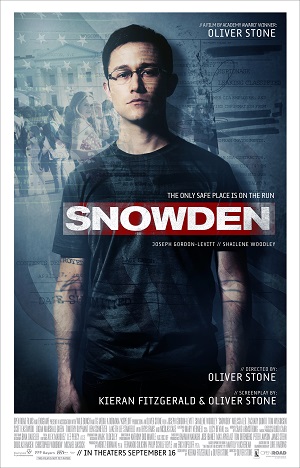
Gordon-Levitt Shines But Stone’s Snowden Still a Sluggish Disappointment
Oliver Stone has never been a filmmaker to shy away from controversy, especially as it concerns the more overtly political films that litter the Academy Award-winner’s resume. From Salvador to World Trade Center, from JFK to W., from Platoon to Wall Street to Born on the Fourth of July to Natural Born Killers to Nixon, the filmmaker has spent 30 years pushing the envelope, and succeed or fail his directorial imprint is never in question no matter what the subject of his latest opus turns out to be.
All of which makes Snowden a little odd. Not because Stone decided he felt the need to bring former CIA and NSA contractor Edward Snowden’s story to the screen, it’s right up his alley, but more because it’s difficult to find his imprint on any one second of the finished feature. Oddly by-the-numbers, aggressively documentary-like in its approach, the film feels like a standard, if slightly sensationalistic, newsmagazine reenactment, the whistleblower’s explosive tale shockingly devoid of energy for most of its sluggish 134 minutes.
This does not, however, make Stone’s latest a total waste. There are some terrific moments, not the least of which is a third act showdown between Snowden (Joseph Gordon-Levitt) and his former professor and boss at the CIA Corbin O’Brian (Rhys Ifans). The two men stare one another down via video link, the latter man projected on a massive conference room screen that takes up the space of an entire wall. It’s a chilling sequence, not just because of what is happening or where it takes place inside the narrative, but also just in the breathless, superlatively imaginative way in which it’s staged. For Stone, it’s arguably the only moment his imprint can be felt, and this is a good thing, the movie coming alive in a way it never does in the same way at any other point.
The other saving grace is Gordon-Levitt, who is superb. His Snowden goes well beyond impersonation of the now well-known whistleblower, isn’t just about getting the vocal inflections and physical mannerism right. This is a thoughtful, emotionally complex performance that gets to the heart of what it is Stone is trying to say in ways the script itself is never able to equal. As his eyes open and his disillusionment grows, Gordon-Levitt makes this progression feel genuine, his rising feelings of apprehension and heartache as his feelings towards the U.S. government’s surveillance apparatus changes palpable throughout.
What’s weird, however, is that with so much rich material to work with, Stone doesn’t cover much of anything that many likely do not already know. While he and his fellow writer Kieran Fitzgerald (The Homesman) base their script on Luke Harding’s The Snowden Files: The Inside Story of the World’s Most Wanted Man and Anatoly Kucheren’s Time of the Octopus, I don’t feel like I learned much more than what has been talked about on the nightly news or was found in Laura Poitras’ Oscar-winning 2014 documentary Citizenfour. It’s all surface level analysis of a dynamically complex subject, and no matter how one feels about the man or his actions that doesn’t make the debate about personal liberty in the digital age any less important.
Stone begins and ends with the Poitras documentary, using her interviews alongside The Guardian journalists Glenn Greenwald and Ewen MacAskill in a Hong Kong hotel room as the framing device to bring the nuts and bolts of Snowden’s subterfuge to life. Melissa Leo, Zachary Quinto and Tom Wilkinson portray the trio, but other than a vocal argument with New York editor Janine Gibson (Joely Richardson) they rarely get to do anything notable, each going through the motions of reenacting what we saw their real-life counterparts do in Citizenfour.
Which is better than what happens to poor Shailene Woodley. She plays Snowden’s longtime girlfriend Lindsay Mills, and to say the character is thinly constructed would be underselling things considerably. While Woodley does her best, it still remains unclear why she sticks with Snowden, the chemistry between the actress and Gordon-Levitt nonexistent. The pair do have one great scene, and that’s in the yard of their Hawaiian home right before the cyber analyst decides to abscond with his bevy of confidential and top secret documents. But that’s it, and for a relationship that’s proven to be so unbreakable (Mills up and moved to Russia to be with her boyfriend in real life), that there’s no romantic heat between them makes believing this, even though it is true, next to impossible.
I respect that Stone felt the need to constrain himself, that this story was so important it didn’t need any extra visual or directorial flamboyance. At the same time, the lack of heat, the absence of energy, it ends up making Snowden come across like much less than it should be. I wanted more, and, to put it frankly, with Stone at the helm it’s not too surprising that I was a little disappointed that I didn’t get it. There is a conversation that still needs to be had as far as what it is the former analyst did, about the secrets he brought into the light, but this movie is just rehashing the arguments that have already taken place, all of which results in a discussion I just didn’t care to engage in.
Review reprinted courtesy of the SGN in Seattle
Film Rating: 2 (out of 4)








